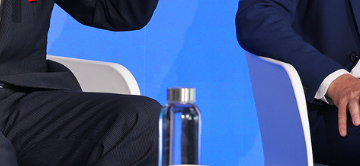As Francisco, the Argentine born Pope concludes a Latin American visit that took him to Ecuador, Bolivia and Paraguay, many observers have put emphasis on the social agenda that has been obvious in his many acts and words.
In Quito, in front of 800,000 persons, Francisco claimed that “the pursuit of social and economic justice is a sacred duty of all Christians”. In Santa Cruz de la Sierra, Bolivia, a million persons could hear him saying: “There should be no family without a home, no farmer with land, no workers without rights, no people without sovereignty, no person without dignity, no child without childhood, no youth without possibilities, no elderly without venerable old age”. He clearly rejected trickle down economic theories, whereby making the rich even better off indirectly benefits everybody, by affirming we cannot be satisfied with a situation in which "a few drops fall whenever the poor shake a cup”.
Days later, in Paraguay, he visited the shantytown of Bañado Norte, in the outskirt of Asuncion, where he met the poorest of the poor, living as squatters on land that gets flooded for months every year, and heard them protesting the abandonment from the State in which they live. Everywhere, from the visit to the women’s jail Buen Pastor, to the final mass in Ñu Guazu in front of another crowd of over a million people, he denounced corruption, injustice against the poor, and called for a fair justice and for development with a human face.
Fervor was unbelievable, which was no surprise in what is still the stronghold region of the Catholic Church. No political leader or artist could ever dream of gathering similar amount of people and elicit such feelings of hope and devotion. In some places, such as Ñu Guazu, tens of thousands of people spent a whole day and slept in the mud under the rain, waiting to see him.
And not only was there religious fervor, but the Pope’s social message also stroke a deep and more political cord with all those who followed Francisco’s path in all three countries. This was particularly obvious from the protest directed to the organization of the Paraguayan visit, in which officials and politicians were perceived to be offered an undeserved front seat in many occasions. In Ñu Guazu, people having waited for hours and days in terrible conditions balked when they saw thousands of VIP invitees, among them some notoriously corrupt politicians, getting a last minute dry seat in the first rows.
In the Leon Condou Stadium in Asuncion, where a meeting with representatives of the civil society was organized, the crowd booed the president of Paraguay, Horacio Cartes, who unexpectedly attended the event. When Francisco entered the scene and asked the audience whether there was justice in this place, a unique and loud voice shouted back that there was none in their country. He then went on to mock politicians lying to the people, raising waves of approvals.
Given such disbelief in their elected authorities, which was felt at every step and largely discussed in social media, and the commonly shared view that the current economic system is not delivering in the fight against poverty, one would expect to see the consequences in future electoral contests. However, when, in a few months Paraguayan voters chose their mayors for the next five years, it is largely expected that they will vote once again for the same faces they openly reject in these days. Indeed, in Paraguay, the Colorado party of the current president has controlled power for 63 of the last 67 years, and the odds are that this will go on for the foreseeable future.
What accounts for this paradox? Some answers may be found in the recent economic and political science literature. Stories of rigged elections and vote buying of course immediately come to mind. In Asuncion’s Bañados, home to around 150,000 people, close to one fourth of the city population, a majority of which work as “gancheros”, i.e., garbage collectors in the city garbage dump, the last months saw the waltz of political operators distributing food and medical supply, and of trucks bringing gravels to cover flooded tracks of land, all in the name of the candidates. Research in Brazil and elsewhere has shown that clientelism and large-scale vote buying often dramatically influence elections’ results, increasing turnout and leading to worst politicians in power. However, better controlling vote-buying may simply mean that many of those who traditionally sold their vote will just no participate anymore, so we still need to understand the best way to address this issue.
A second explanation is that although people have pretty good information on the quality of politicians, they may lack incentive to punish. Surprising as it may sound, for many poor people, small, short term gains for sure (votes sometimes sell for as little as 10 or 20 dollars), may still dominate longer term, uncertain gain from voting for the challengers. This is not surprising, given the evidence that the stress linked to poverty often reduces the cognitive ability to ponder complex situations, and the by-know well known fact that the poor have higher discount rates, which means they tend not to value a lot potential gains in the future.
An additional, simple and powerful factor may be in many cases the lack of a credible alternative. For example, a field experiment in Mexico showed that one of the main consequences of randomly providing some voters with information on politicians’ corruption was to reduce turnout at the polls. Given the induced presumption that all politicians are corrupt, and in the absence of strong evidence to the contrary, voters may well prefer to withdraw from the poll.
Finally, electoral systems may not allow for the expression of real preferences. In contexts in which the rules governing the financing of political campaign are opaque, weak or even non-existing, it may be too difficult for alternative candidates to stand of chance of winning. And rules that limit the choices that voters can make, such as blocked party lists in proportional elections, may prevent voters from choosing among candidates, in contexts where party identification remains strong.
In an ongoing experiment with 3,000 households in several areas of Paraguay, we (a multidisciplinary team of Toulouse researchers) are inquiring how these different channels play out. We randomly provide individuals with several reminders of a high-profile corruption scandal involving members of the country’s Senate, and then ask them to vote in a remake of the recent legislative election under alternative blocked and open lists procedures. The results, which are still under analysis, will start telling us something about the pros and cons of corruption reminders and the potential effect of alternative voting systems. How fast do memories of corruption fade out? Does it make a difference to frame information by explicitly referring to the reactions of others in the social network? Do people take advantage of open lists to punish individuals when they may be reluctant to punish their party of choice? Or are open list procedures possibly too complex to elicit consistent behavior when voters have to choose among more than twenty lists with forty five candidates each?
Whether politicians, who might be in charge of implementing the very mechanisms that will tame their power, will follow suit is of course another story. The Paraguayan Congress has held off a proposal to reform the electoral system for years. And recently, a Brazilian colleague told me how disappointed he was by a current move of his country’s Congress to remove any mayoral reelection possibility, in a context in which solid recent research, some on Brazil itself, has made a clear case that reelection prospects help reducing corruption at the municipal level.
Social justice must not only be desired, it has to be engineered, and a key first step towards that goal is a clear understanding of the mechanisms conditioning the fair expression of popular will. The Pope’s visit and his strong God-inspired words will no doubt move the conscience of many Ecuadorians, Bolivians, and Paraguayans, but the devil may still lie in the details of political institutions, and this is where researchers can modestly help, by making their research relevant.





Add new comment